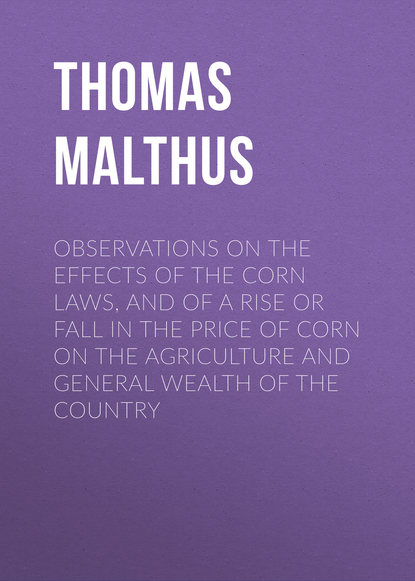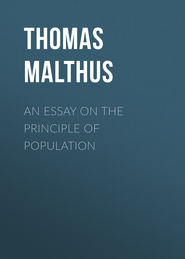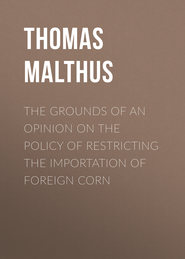По всем вопросам обращайтесь на: info@litportal.ru
(©) 2003-2025.
✖
Observations on the Effects of the Corn Laws, and of a Rise or Fall in the Price of Corn on the Agriculture and General Wealth of the Country
Автор
Год написания книги
2019
Настройки чтения
Размер шрифта
Высота строк
Поля
Thomas Robert Malthus
T. R. Malthus
Observations on the Effects of the Corn Laws, and of a Rise or Fall in the Price of Corn on the Agriculture and General Wealth of the Country
Observations, &c. &c
A revision of the corn laws, it is understood, is immediately to come under the consideration of the legislature. That the decision on such a subject, should be founded on a correct and enlightened view of the whole question, will be allowed to be of the utmost importance, both with regard to the stability of the measures to be adopted, and the effects to be expected from them.
For an attempt to contribute to the stock of information necessary to form such a decision, no apology can be necessary. It may seem indeed probable, that but little further light can be thrown on a subject, which, owing to the system adopted in this country, has been so frequently the topic of discussion; but, after the best consideration which I have been able to give it, I own, it appears to me, that some important considerations have been neglected on both sides of the question, and that the effects of the corn laws, and of a rise or fall in the price of corn, on the agriculture and general wealth of the state, have not yet been fully laid before the public.
If this be true, I cannot help attributing it in some degree to the very peculiar argument brought forward by Dr Smith, in his discussion of the bounty upon the exportation of corn. Those who are conversant with the Wealth of nations, will be aware, that its great author has, on this occasion, left entirely in the background the broad, grand, and almost unanswerable arguments, which the general principles of political economy furnish in abundance against all systems of bounties and restrictions, and has only brought forwards, in a prominent manner, one which, it is intended, should apply to corn alone. It is not surprising that so high an authority should have had the effect of attracting the attention of the advocates of each side of the question, in an especial manner, to this particular argument. Those who have maintained the same cause with Dr Smith, have treated it nearly in the same way; and, though they may have alluded to the other more general and legitimate arguments against bounties and restrictions, have almost universally seemed to place their chief reliance on the appropriate and particular argument relating to the nature of corn.
On the other hand, those who have taken the opposite side of the question, if they have imagined that they had combated this particular argument with success, have been too apt to consider the point as determined, without much reference to the more weighty and important arguments, which remained behind.
Among the latter description of persons I must rank myself. I have always thought, and still think, that this peculiar argument of Dr Smith, is fundamentally erroneous, and that it cannot be maintained without violating the great principles of supply and demand, and contradicting the general spirit and scope of the reasonings, which pervade the Wealth of nations.
But I am most ready to confess, that, on a former occasion, when I considered the corn laws, my attention was too much engrossed by this one peculiar view of the subject, to give the other arguments, which belong to it, their due weight.
I am anxious to correct an error, of which I feel conscious. It is not however my intention, on the present occasion, to express an opinion on the general question. I shall only endeavour to state, with the strictest impartiality, what appear to me to be the advantages and disadvantages of each system, in the actual circumstances of our present situation, and what are the specific consequences, which may be expected to result from the adoption of either. My main object is to assist in affording the materials for a just and enlightened decision; and, whatever that decision may be, to prevent disappointment, in the event of the effects of the measure not being such as were previously contemplated. Nothing would tend so powerfully to bring the general principles of political economy into disrepute, and to prevent their spreading, as their being supported upon any occasion by reasoning, which constant and unequivocal experience should afterwards prove to be fallacious.
We must begin, therefore, by an inquiry into the truth of Dr Smith's argument, as we cannot with propriety proceed to the main question, till this preliminary point is settled.
The substance of his argument is, that corn is of so peculiar a nature, that its real price cannot be raised by an increase of its money price; and that, as it is clearly an increase of real price alone which can encourage its production, the rise of money price, occasioned by a bounty, can have no such effect.
It is by no means intended to deny the powerful influence of the price of corn upon the price of labour, on an average of a considerable number of years; but that this influence is not such as to prevent the movement of capital to, or from the land, which is the precise point in question, will be made sufficiently evident by a short inquiry into the manner in which labour is paid and brought into the market, and by a consideration of the consequences to which the assumption of Dr Smith's proposition would inevitably lead.
In the first place, if we inquire into the expenditure of the labouring classes of society, we shall find, that it by no means consists wholly in food, and still less, of course, in mere bread or grain. In looking over that mine of information, for everything relating to prices and labour, Sir Frederick Morton Eden's work on the poor, I find, that in a labourer's family of about an average size, the articles of house rent, fuel, soap, candles, tea, sugar, and clothing, are generally equal to the articles of bread or meal. On a very rough estimate, the whole may be divided into five parts, of which two consist of meal or bread, two of the articles above mentioned, and one of meat, milk, butter, cheese, and potatoes. These divisions are, of course, subject to considerable variations, arising from the number of the family, and the amount of the earnings. But if they merely approximate towards the truth, a rise in the price of corn must be both slow and partial in its effects upon labour. Meat, milk, butter, cheese, and potatoes are slowly affected by the price of corn; house rent, bricks, stone, timber, fuel, soap, candles, and clothing, still more slowly; and, as far as some of them depend, in part or in the whole, upon foreign materials (as is the case with leather, linen, cottons, soap, and candles), they may be considered as independent of it; like the two remaining articles of tea and sugar, which are by no means unimportant in their amount.
It is manifest therefore that the whole of the wages of labour can never rise and fall in proportion to the variations in the price of grain. And that the effect produced by these variations, whatever may be its amount, must be very slow in its operation, is proved by the manner in which the supply of labour takes place; a point, which has been by no means sufficiently attended to.
Every change in the prices of commodities, if left to find their natural level, is occasioned by some change, actual or expected, in the state of the demand or supply. The reason why the consumer pays a tax upon any manufactured commodity, or an advance in the price of any of its component parts, is because, if he cannot or will not pay this advance of price, the commodity will not be supplied in the same quantity as before; and the next year there will only be such a proportion in the market, as is accommodated to the number of persons who will consent to pay the tax. But, in the case of labour, the operation of withdrawing the commodity is much slower and more painful. Although the purchasers refuse to pay the advanced price, the same supply will necessarily remain in the market, not only the next year, but for some years to come. Consequently, if no increase take place in the demand, and the advanced price of provisions be not so great, as to make it obvious that the labourer cannot support his family, it is probable, that he will continue to pay this advance, till a relaxation in the rate of the increase of population causes the market to be under-supplied with labour; and then, of course, the competition among the purchasers will raise the price above the proportion of the advance, in order to restore the supply. In the same manner, if an advance in the price of labour has taken place during two or three years of great scarcity, it is probable that, on the return of plenty, the real recompense of labour will continue higher than the usual average, till a too rapid increase of population causes a competition among the labourers, and a consequent diminution of the price of labour below the usual rate.
This account of the manner in which the price of corn may be expected to operate upon the price of labour, according to the laws which regulate the progress of population, evidently shows, that corn and labour rarely keep an even pace together; but must often be separated at a sufficient distance and for a sufficient time, to change the direction of capital.
As a further confirmation of this truth, it may be useful to consider, secondly, the consequences to which the assumption of Dr Smith's proposition would inevitably lead.
If we suppose, that the real price of corn is unchangeable, or not capable of experiencing a relative increase or decrease of value, compared with labour and other commodities, it will follow, that agriculture is at once excluded from the operation of that principle, so beautifully explained and illustrated by Dr Smith, by which capital flows from one employment to another, according to the various and necessarily fluctuating wants of society. It will follow, that the growth of corn has, at all times, and in all countries, proceeded with a uniform unvarying pace, occasioned only by the equable increase of agricultural capital, and can never have been accelerated, or retarded, by variations of demand. It will follow, that if a country happened to be either overstocked or understocked with corn, no motive of interest could exist for withdrawing capital from agriculture, in the one case, or adding to it in the other, and thus restoring the equilibrium between its different kinds of produce. But these consequences, which would incontestably follow from the doctrine, that the price of corn immediately and entirely regulates the prices of labour and of all other commodities, are so directly contrary to all experience, that the doctrine itself cannot possibly be true; and we may be assured, that, whatever influence the price of corn may have upon other commodities, it is neither so immediate nor so complete, as to make this kind of produce an exception to all others.
That no such exception exists with regard to corn, is implied in all the general reasonings of the Wealth of nations. Dr Smith evidently felt this; and wherever, in consequence, he does not shift the question from the exchangeable value of corn to its physical properties, he speaks with an unusual want of precision, and qualifies his positions by the expressions much, and in any considerable degree. But it should be recollected, that, with these qualifications, the argument is brought forward expressly for the purpose of showing, that the rise of price, acknowledged to be occasioned by a bounty, on its first establishment, is nominal and not real. Now, what is meant to be distinctly asserted here is, that a rise of price occasioned by a bounty upon the exportation or restrictions upon the importation of corn, cannot be less real than a rise of price to the same amount, occasioned by a course of bad seasons, an increase of population, the rapid progress of commercial wealth, or any other natural cause; and that, if Dr Smith's argument, with its qualifications, be valid for the purpose for which it is advanced, it applies equally to an increased price occasioned by a natural demand.
Let us suppose, for instance, an increase in the demand and the price of corn, occasioned by an unusually prosperous state of our manufactures and foreign commerce; a fact which has frequently come within our own experience. According to the principles of supply and demand, and the general principles of the Wealth of nations, such an increase in the price of corn would give a decided stimulus to agriculture; and a more than usual quantity of capital would be laid out upon the land, as appears obviously to have been the case in this country during the last twenty years. According to the peculiar argument of Dr Smith, however, no such stimulus could have been given to agriculture. The rise in the price of corn would have been immediately followed by a proportionate rise in the price of labour and of all other commodities; and, though the farmer and landlord might have obtained, on an average, seventy five shillings a quarter for their corn, instead of sixty, yet the farmer would not have been enabled to cultivate better, nor the landlord to live better. And thus it would appear, that agriculture is beyond the operation of that principle, which distributes the capital of a nation according to the varying profits of stock in different employments; and that no increase of price can, at any time or in any country, materially accelerate the growth of corn, or determine a greater quantity of capital to agriculture.
The experience of every person, who sees what is going forward on the land, and the feelings and conduct both of farmers and landlords, abundantly contradict this reasoning.
Dr Smith was evidently led into this train of argument, from his habit of considering labour as the standard measure of value, and corn as the measure of labour. But, that corn is a very inaccurate measure of labour, the history of our own country will amply demonstrate; where labour, compared with corn, will be found to have experienced very great and striking variations, not only from year to year, but from century to century; and for ten, twenty, and thirty years together;[1 - From the reign of Edward III to the reign of Henry VII, a day's earnings, in corn, rose from a pack to near half a bushel, and from Henry VII to the end of Elizabeth, it fell from near half a bushel to little more than half a peck.]









